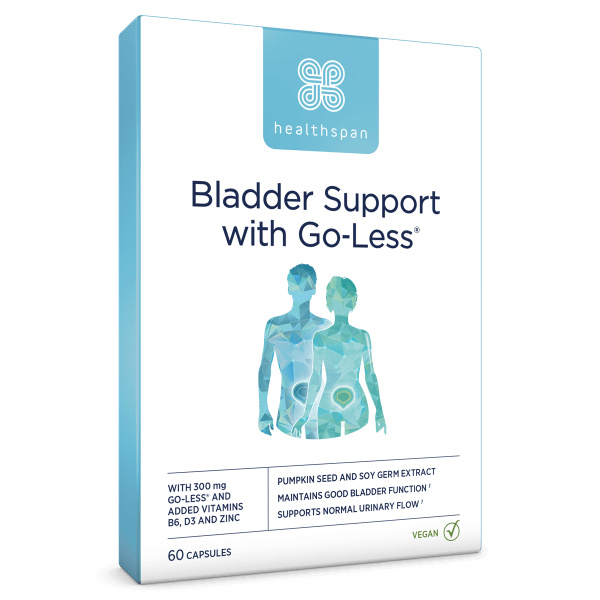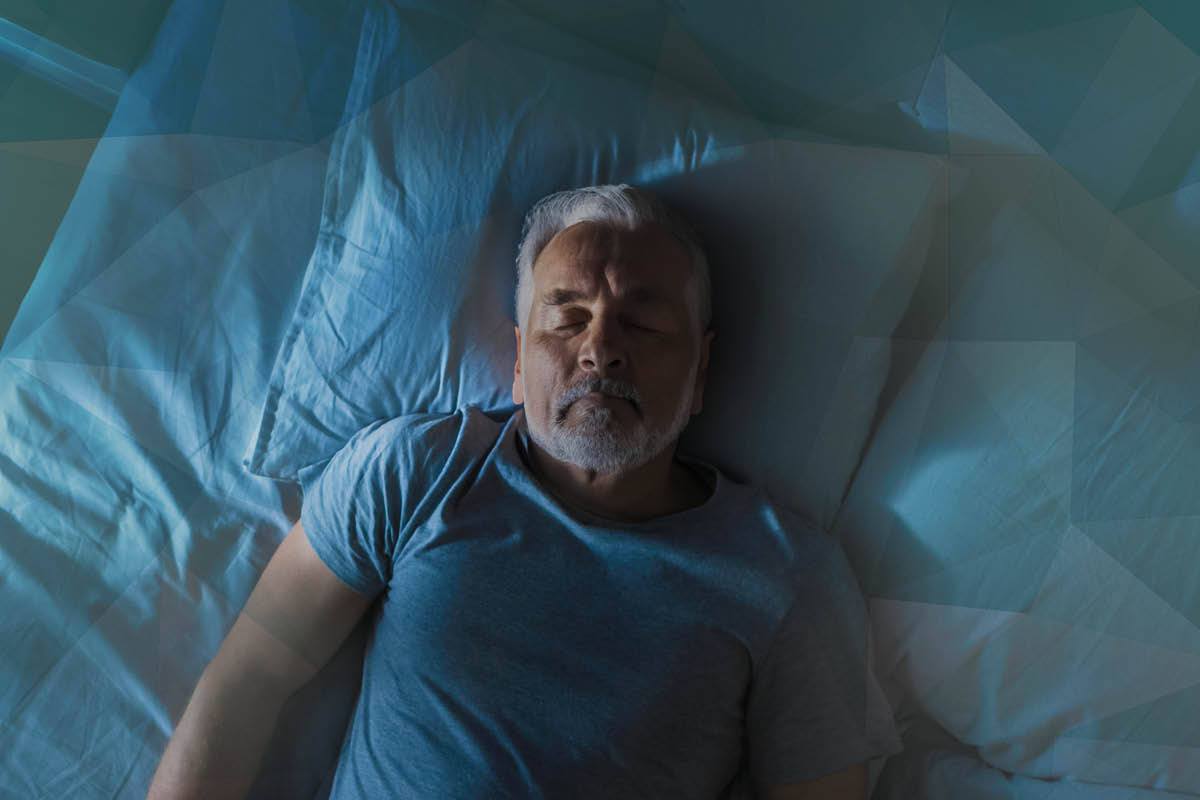Jane Collins discusses the most common bladder problems that can affect men, and the lifestyle changes and supplements that can help.
Few of us actively think about the well-being of our bladder. That is, until something goes wrong. Maybe you notice your urine flow is not as strong as it once was, you might feel a burning sensation when you pee, or you're just peeing more than you used to and it's disrupting your sleep.
Here we examine the most common bladder problems affecting men, and what you can do to minimise their impact on your quality of life.
Stress incontinence
This is the medical term for when you leak a small amount of urine when you laugh, sneeze, cough, exercise and/or lift heavy objects. Stress incontinence tends to be more common in women, but it can occur after prostate surgery (see Enlarged Prostate, below) in men.
Urgency incontinence
Also referred to as overactive bladder (OAB), this is an involuntary leakage of urine accompanied by an overwhelming need to pee. The bladder muscles do not work effectively and cannot contract enough to stop urine from leaking.
In men, it is often caused by Benign Prostatic Hyperplasia (see below). It is also linked to inflammation of the bladder, infection, bladder stones, and diabetes.
Conditions including Parkinson's, MS and stroke are also associated with having an overactive bladder. Drinking alcohol or caffeine to excess are also known triggers (both are diuretics and make you go the toilet more.) Being overweight can also lead to an overactive bladder as excess weight puts more pressure on your bladder.
Overflow incontinence
This causes an almost permanent urine leak or dribble and is very common in men. It can be caused by a bladder obstruction, an enlarged prostate (see below), as a side effect of diabetes or as a result of taking medicines like diuretics, causing the bladder to get too full and overflow. Treatments include bladder training like exercising pelvic floor muscles or medication to shrink an enlarged prostate.
Nocturia
Nocturia is the medical term for when you have to get up to pee at least two or three times a night – something which is thought to affect an estimated 9.1 million adults in the UK.
It can be caused by lifestyle habits like drinking too much alcohol or caffeine, or be a sign of an underlying health condition like a UTI. Other medical causes include an infected or enlarged prostate (see below), overactive bladder, diabetes, kidney disease, high blood pressure, acid reflux or neurological conditions like Parkinson's and MS. If lifestyle changes don't help, your GP can potentially prescribe a class of drugs called anticholinergics, which reduce bladder spasms.

Bladder Support with Go-Less®
For good bladder health and urinary flow
- Contains 300mg Go-Less® pumpkin seed and soy germ extract
- Vitamins B6 and D3 for hormonal balance and muscle support
- Suitable for men and women
Nocturia: how to stop frequent urination at night
Nocturia can significantly disrupt sleep, with a knock-on effect on quality of life. Fortunately there are ways to help manage the condition.
Read more
Urinary Tract Infections (UTIs)
UTIs are caused when bacteria enters your urinary tract. This can irritate the lining of the tract, and cause an infection of the bladder, urethra or kidneys. A UTI typically causes a burning or painful sensation when you pee and your urine can be cloudy and smell bad.
You will probably feel the urge to urinate frequently but find you can't pass much urine. You might also have a temperature and feel discomfort around your abdomen or pelvic area. UTIs can clear up with lifestyle measures such as drinking more fluids, but if they persist they are commonly treated with antibiotics.
Enlarged prostate
More than half of all men in their 60s develop an enlarged prostate condition known as Benign Prostatic Hyperplasia (BPH). This number increases the older you get, as the prostate gland slowly enlarges and can narrow the outlet of the bladder.
Typically BPH will show up in the form of feeling desperate to pee and more frequent night-time toilet trips. As the prostate gets larger you will probably experience a slower flow of urine, difficulty getting the flow started, and possibly some dribbling and leakage.
Medication is available to help shrink the prostate. If medication doesn't work surgery may be recommended.
Kidney stones
This is a fairly common condition that will affect a quarter of people in their lifetime. Small 'stones' (hard deposits made up of minerals and salts) form inside your kidneys. Small ones are mainly passed without incident, but if they are larger they can cause severe pain in your side.
You'll probably also feel pain when you urinate, may notice blood in your urine, and you are likely to feel sick. The stones typically develop if there is a family history of kidney stones, you don't drink enough fluids or have a blockage in your urinary tract. Certain protein-rich foods like meat and fish can also contribute to stones forming, and regularly using calcium-based antacids can also increase your risk.
Lifestyle changes such as drinking more water and reducing how much salt you eat can help, and most stones will pass by themselves. If the problem is particularly severe your doctor may recommend surgery.
How to help your bladder
There is a range of simple lifestyle changes and habits to help improve your bladder health.
- Maintain a healthy weight. Carrying excess weight can put pressure on your bladder.
- If you take diuretic medications, such as for high blood pressure, try to take them earlier in the day so they don't lead to excessive urination at night.
- Cut down on salt in your diet. Salt is a known diuretic, and a 2019 study suggests that nocturia may be linked to hypertension and a high salt consumption.
- Cut down, or ideally stop, smoking. Nicotine can irritate the bladder, and one study has shown heavy smokers are more likely to be incontinent than non-smokers. It is suggested that because smokers cough more this is an added risk factor for urinary incontinence.
- Reduce the amount you drink two to four hours before bedtime.
- Try to avoid having caffeinated drinks (coffee, tea, hot chocolate, cola, energy drinks) after around 6pm. Caffeine is a diuretic and can contribute to bladder irritation and stimulate muscle contractions.
- Avoid alcohol too close to bedtime.
- Practice exercising your pelvic floor muscles. Women are routinely recommended to exercise theirs (particularly after giving birth), but men can also benefit. These exercises should help strengthen your pelvic floor muscles and give you better control over your bladder, with a particular benefit to conditions like stress incontinence, urge incontinence and prolapse. There are a range of exercise videos online to get you started.
- Take regular exercise. Regular moderate physical exercise should not only help to keep your weight down and reduce your risk of developing diabetes (which is also known to affect bladder health), but it can also alleviate constipation (not moving your bowels regularly can cause stool to build up in the colon, putting pressure on your bladder and keeping it from fully expanding.)
- Sit down less. A study that followed almost 70,000 healthy middle-aged men over the course of two and a half years recorded the amount of time they spent sitting down, the amount of exercise they took and the prevalence of urinary tract infections. The researchers found that those who spent five hours or more sitting (and did less exercise generally) were more at risk of developing bladder problems including incomplete emptying of the bladder, increased urinary frequency, a weak urine stream and/or having to get up for a pee frequently in the night.
- If you are increasingly concerned about the health of your bladder, keep a record over a few weeks logging what appears to make matters worse: drinking alcohol, too much of any fluid drunk close to bedtime, increased stress and anxiety or something else. This can help to pinpoint what lifestyle changes you can make, and if these don't help you also have evidence to show your GP.
Cranberry extract
Components in cranberries known as pro-anthocyanidins are thought to prevent bacteria from sticking to the bladder wall and also reduce inflammation. Drinking cranberry juice or taking cranberry supplements is a well-known natural treatment.
One review found that cranberry juice and supplements reduced UTI recurrence in women by 26 per cent. There is more evidence to show that cranberry extract supplements are more effective at reducing UTIs than the juice alone, because they are a more concentrated source of the active compounds thought to help treat UTIs.
Vitamin D
A study published in 2022 showed a clear connection between vitamin D and bladder health. Not getting enough of this vitamin has been linked to an overactive bladder (OAB), urinary incontinence and lower-urinary-tract symptoms.
Bladder Support with Go-Less
Bladder Support with Go-Less is a combination of pumpkin seed extract (Cucurbita pepo) and SoyLife, a source of soy isoflavones with added vitamin B6, vitamin D and the mineral zinc. This specially formulated supplement helps maintain good bladder function and urinary flow.
A clinical study involving men with benign prostate hyperplasia given 500mg of Go-Less® each day showed improvements in many aspects of their bladder health, including a reduction in urinary frequency and decrease in their nocturia over time, leading to improved quality of life.
Magnesium
We know that this mineral has a muscle-relaxing effect that can help improve sleep, but it has also been shown to improve symptoms of incontinence by reducing muscle spasms. A small study from Tel Aviv University showed that women who took magnesium hydroxide supplements twice daily saw improvements in their bladder health.
Probiotics
Research suggests that some probiotics, especially those with strains from the Lactobacilli family, may help treat and prevent UTIs. It is thought that they do this by preventing harmful bacteria from attaching to urinary tract cells.
Saw palmetto
Saw palmetto is commonly used in supplements designed to improve prostate health and urinary function. In one small study from 2020, men who took a daily 1,000mg saw palmetto supplement enriched with a substance called beta-sitosterol reported improvements in symptoms of benign prostate hyperplasia (which include urinary incontinence and nocturia), compared to those who took unenriched saw palmetto.

Bladder Support with Go-Less®
For good bladder health and urinary flow
- Contains 300mg Go-Less® pumpkin seed and soy germ extract
- Vitamins B6 and D3 for hormonal balance and muscle support
- Suitable for men and women








